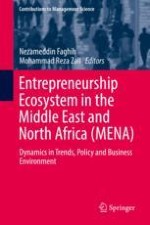2018 | OriginalPaper | Buchkapitel
The Innovation-Based Competitive Advantage in Oman’s Transition to a Knowledge-Based Economy: Dynamics of Innovation for Promotion of Entrepreneurship
verfasst von : Mahshid Sazegar, Amir Forouharfar, Victoria Hill, Nezameddin Faghih
Erschienen in: Entrepreneurship Ecosystem in the Middle East and North Africa (MENA)
Aktivieren Sie unsere intelligente Suche, um passende Fachinhalte oder Patente zu finden.
Wählen Sie Textabschnitte aus um mit Künstlicher Intelligenz passenden Patente zu finden. powered by
Markieren Sie Textabschnitte, um KI-gestützt weitere passende Inhalte zu finden. powered by
